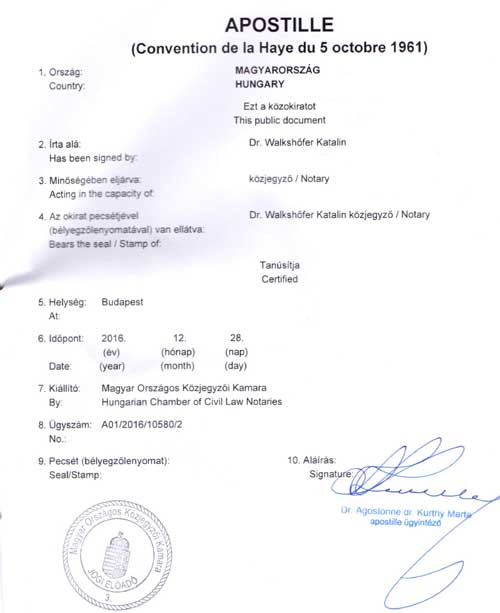
Schmidt & Schmidt covers the full spectrum of legalization services for documents issued in Hungary.
Hungary joined the Hague Convention on the Simplified Authentication of Documents on 18 April 1972; the Convention entered into force on 18 January 1973.
The apostille, or the “Hague apostille” is a certificate that authenticates the origin of a public document (e.g., a birth, marriage or death certificate, a judgment, an extract of a register or a notarial attestation). It confirms the authenticity of the signature and the authority of an official who signed the public document.
Documents issued in Hungary are certified with an apostille in accordance with the Hague Convention of 1961 are recognized in all Member States of the Hague Convention and do not require any other form of certification, such as consular legalization, which considerably reduces the costs and time required for the certification of documents. So far, more than 120 states have joined the Convention.
The apostille is not sufficient for use in the states that are not party to the Hague Convention. In this case, consular legalization applies to a public document.
Designated Competent Apostille Authorities in Hungary
In Hungary, the official entities responsible for apostilles are as follows:
- The Ministry of Public Administration and Justice of the Republic of Hungary, Department of Private International Law, handles apostilles for public documents and legalizations executed by judicial authorities, excluding those issued and legalized by civil law notaries.
- The Hungarian Chamber of Civil Law Notaries manages apostilles for public documents and legalizations executed by civil law notaries.
- The Ministry for Foreign Affairs of the Republic of Hungary is in charge of apostilles for public documents and legalizations executed by other authorities.
The apostille in Hungary is a square stamp in Hungarian and English with the obligatory heading "Apostille" and a reference to the 1961 Hague Convention in French (Convention de La Haye du 5 octobre 1961). The apostille certificate’s sides will be at least 9 centimeters long.
Types of documents

| Can be apostillized | Cannot be apostillized |
|---|---|
|
|
Specific aspects and document requirements for the apostille in Hungary
The apostille process can vary depending on the sender and recipient country, but typically to obtain an apostille for a document in Hungary, you must go through the following steps:
- Obtaining the original document to be apostilled;
- Verification of the signature on the document by the authorized body;
- Issuance of an apostille on a document by an authorized body;
- Submission of the document together with the apostille in the recipient country.
This process can be time-consuming, especially if it includes multiple documents and different countries. To ensure a smooth and accurate apostille process, it is recommended to seek guidance from specialists familiar with the requirements and procedures. Their expertise can help avoid delays and errors in obtaining documents apostille.
Document requirements that might apply:
- The document should bear the original stamp of the issuing authority, with the authority's name clearly visible.
- The document must include the signature and printed name of the individual who applied for the stamp.
- The position or official title of the person who stamped the document should also be indicated.
The apostille is issued in a uniform format. In Hungary, it has the form of a printed sticker with a handwritten signature of an official, an official seal, and a hologram.
In cases where apostilles are not recognized, holders of foreign documents will need to legalize them instead. However, If the country of destination of the document recognizes and issues apostilles, then legalization is unnecessary.
Legalization of Hungarian educational documents for use abroad
In order for educational documents issued in Hungary, such as school reports, university degree certificates, transcripts of records, enrollment certificates, and other certificates from schools or universities, to be valid and recognized abroad, they must undergo a process of certification through legalization or apostille.
To utilize your Hungarian diploma abroad, a two-step process for legalization is required:
- Intermediate Legalization at the Office of Education:
- Apostille Certificate by the Ministry of Foreign Affairs and Trade:
In order to do this, you will most likely need to visit the Customer Service at the Office of Education in Budapest, bringing original documents along with necessary copies.
For countries in the Hague Apostille Convention, Ministry of Foreign Affairs handles the process of issuing apostilles. Interim authentication by the Office of Education is necessary before proceeding. You will need to submit stamped documents in person at the Ministry of Foreign Affairs, with a legalization fee of 5,500 HUF per signature, payable upon document submission. The processing time varies, and the above process and requirements can be subject to change based on prevailing regulations and policies.
Recognition of the authenticity of public documents within the EU
Hungary has established Bilateral agreements with Albania, Algeria, Austria, Belarus, Belgium, Bosnia and Herzegovina, Bulgaria, China, Croatia, Cyprus, Cuba, Czech Republic, Egypt, Finland, France, Greece, Italy, Iraq, Kosovo, Macedonia, Moldova, Mongolia, Montenegro, North Korea, Poland, Russia, Romania, Serbia, Slovakia, Slovenia, Syria, Tunisia, Turkey, Ukraine, and Vietnam.
Regulation on public documents (EU) 2016/1191 of 6 July 2016
Furthermore, Regulation (EU) 2016/1191 of 6 July 2016 on public documents simplifies the circulation of certain public documents that must be presented in an EU Member State and have been issued in another EU Member State, thus exempting public documents from the confirmation of authenticity with the Apostille with the aim of reducing administrative burden and costs for citizens.
Consular legalization of Hungarian documents for use abroad
Consular legalization is the process of authenticating or certifying a legal document so a foreign country's legal system will recognize it as with full legal effect that is carried out by the diplomatic or consular mission of the country in which the document is to be used.
Consular legalization is more complex, time-consuming and costly than the simpler apostille procedure. Whereas apostille is usually issued within one step, consular legalization requires several pre-certifications before a public document can be certified at the embassy or consulate of the destination country.
It is a common requirement that the document has to be translated into the official language of the destination country before submission to the embassy. It is up to the diplomatic mission to decide about the authentication procedure.
The main differences between an apostille and consular legalization of documents
The common feature between apostille and consular legalization is that they authenticate an official document for presentation to institutions in another country. However, they have many differences.
| Apostille | Consular legalization | |
|---|---|---|
| Legal effect | Can be used in all countries that are party to the Hague Convention on the Simplified Legalization of Documents. | Use between States one or both of which is not a member of the Hague Convention, or where one of the contracting States has protested the accession of the other. |
| Difficulty | Moderate. To obtain an apostille, contact the competent apostille authority of the state of origin of the document. | High. For consular legalization, various inland authorities and a diplomatic mission of the state of destination must be involved. |
| Pre-certification | Usually not required. | Is obligatory. |
| Attestation at the state of destination embassy in the state of origin of the document | No need to contact the Consulate of the country of destination. | Is the final step of legalization. |
Apostille and consular legalization in all cities of Hungary
Schmidt & Schmidt provides apostille and consular legalization services for public documents originating from all regions across Hungary. We handle the entire process, from document review to obtaining the necessary certifications, ensuring that your documents are valid and recognized internationally. With our reliable services, you can confidently use your Hungarian public documents abroad.
Procurement of documents from Hungary
If the important documents are lost or damaged, or current copies of the documents are needed, the re-issue of the documents is required. It is not unusual for people outside Hungary to encounter difficulties with obtaining new documents when abroad. Our consultants will help you procure new documents from Hungary remotely, and we can arrange for your documents to be sent by courier anywhere in the world.
Certified translation of documents from Hungary
Copies and transcripts of civil status documents can be translated into any language by a sworn translator in Hungary or the translation can be done in the country of destination. We offer certified translations of civil status documents with further certification. The cost of the work is calculated according to the volume of the document in question.
Does the translation have to be apostillized?
Any foreign document issued in one country and used in another country must be legalized for use abroad. Therefore, the authenticity of a certified translation from Hungary needs to be certified by an apostille. Consequently, many authorities may not accept certified translations from Hungary if the translation has not been properly authenticated in Hungary for use abroad. To avoid this confusion, translations should better be made in the state of the destination of the document.

























































